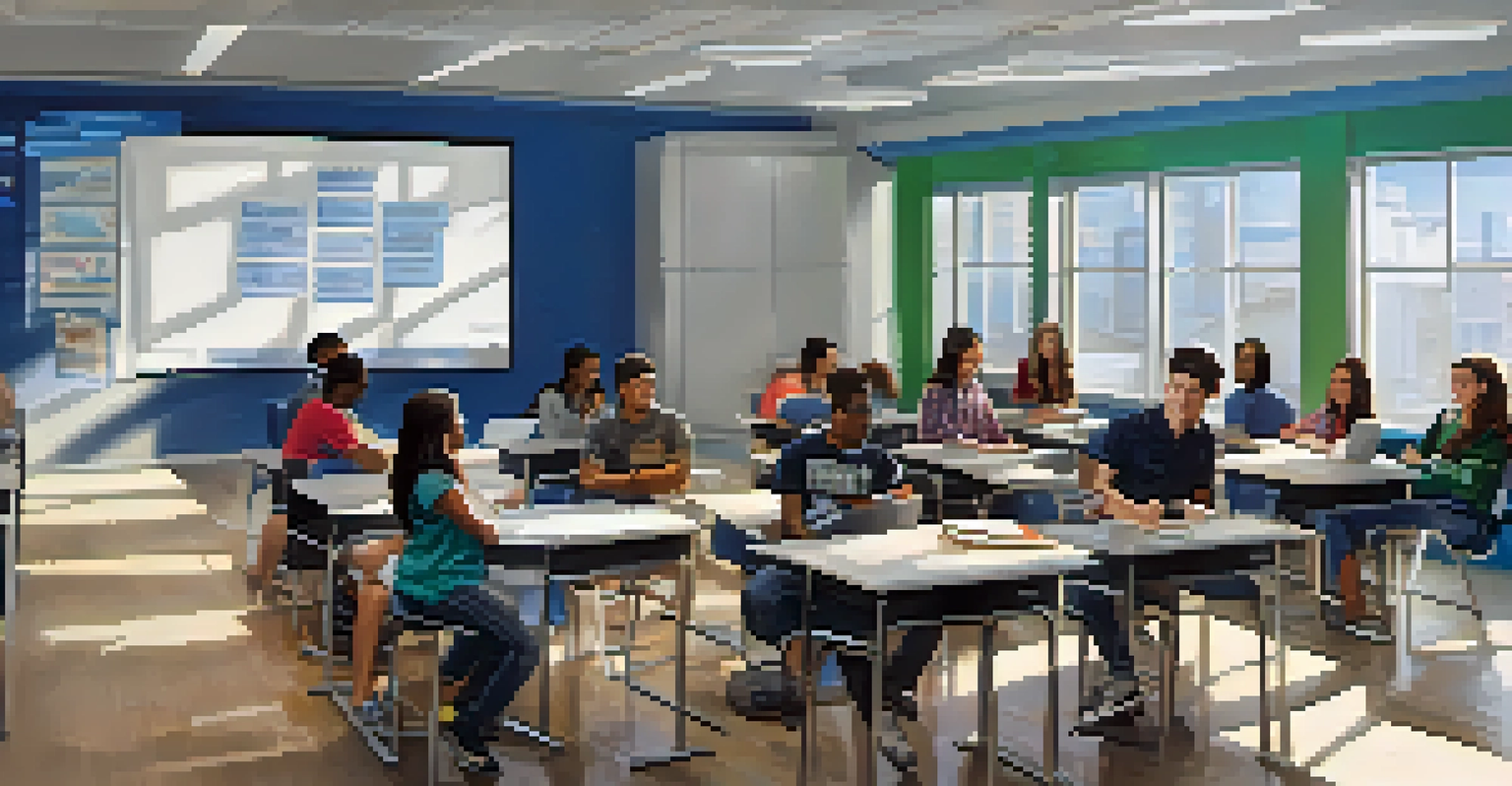Atlanta's Higher Education Landscape: Institutions Reviewed

Overview of Atlanta's Higher Education Landscape
Atlanta is known for its rich cultural heritage and vibrant economy, but it also boasts a diverse higher education landscape. With a mix of public and private institutions, the city accommodates a wide range of academic pursuits. From research universities to liberal arts colleges, Atlanta offers something for every type of student. This variety enriches the educational experience and fosters a spirit of collaboration among institutions.
Education is the most powerful weapon which you can use to change the world.
The city is home to several notable universities, including Georgia State University and Emory University, each contributing to Atlanta's reputation as an educational hub. These institutions not only attract students from all over the country but also from around the globe. This influx of diverse perspectives enhances the learning environment and prepares students for a globalized workforce.
Moreover, Atlanta's educational ecosystem is supported by numerous community colleges and technical schools. These institutions provide accessible pathways for students looking to gain workforce skills or transfer to four-year colleges. Together, they create a robust educational framework that benefits the entire community.
Georgia State University: A Leading Public Institution
Georgia State University (GSU) stands out as one of the largest public universities in the Southeast, with a diverse student population exceeding 50,000. Located in downtown Atlanta, GSU offers a wide range of undergraduate and graduate programs, making it an attractive option for students seeking variety. The university is particularly known for its strong emphasis on research and community engagement, contributing significantly to local development.

GSU's commitment to accessibility is evident through its various support programs aimed at helping students succeed academically and professionally. The university has received national recognition for its efforts in increasing graduation rates among underrepresented groups. This focus on inclusivity not only enriches the campus culture but also plays a vital role in shaping Atlanta's future workforce.
Diverse Higher Education Options
Atlanta offers a rich mix of public and private institutions, catering to various academic pursuits and fostering collaboration.
Furthermore, GSU's urban campus provides students with unique opportunities for internships and networking. Being situated in a bustling city allows students to connect with local businesses and organizations, enhancing their educational experience. This blend of academics and real-world application makes GSU a cornerstone of Atlanta's higher education landscape.
Emory University: A Private Research Powerhouse
Emory University is renowned for its rigorous academic programs and research initiatives, consistently ranking among the top private universities in the nation. With a beautiful campus located in the Druid Hills neighborhood, Emory offers a serene environment for students to thrive academically. The university's commitment to research is evident through its various institutes and partnerships, particularly in health and medicine.
The beautiful thing about learning is that no one can take it away from you.
One of Emory's standout features is its strong emphasis on interdisciplinary studies. Students are encouraged to explore connections between different fields, fostering innovative thinking and collaboration. This approach prepares graduates to tackle complex global challenges, making them highly sought after in the job market.
Additionally, Emory's vibrant campus life and diverse student body contribute to a rich educational experience. With a plethora of student organizations, cultural events, and community service opportunities, Emory fosters a sense of belonging and engagement. This dynamic environment helps students grow not only academically but also personally.
Clark Atlanta University: A Historic HBCU
Clark Atlanta University (CAU) is a prestigious historically Black college and university (HBCU) that has played a significant role in shaping African American education. Founded in 1865, CAU emphasizes academic excellence and social justice, preparing students to become leaders in their communities. The university offers a range of undergraduate and graduate programs, with a strong focus on liberal arts, business, and social sciences.
As an HBCU, CAU is deeply committed to fostering a supportive environment for African American students and promoting diversity. The university's programs are designed to empower students through mentorship, leadership, and community engagement. This unique focus not only enriches the student experience but also contributes to the broader mission of social equity.
Community Colleges Enhance Access
Community colleges in Atlanta provide affordable and flexible pathways for students seeking vocational training or a transfer to four-year universities.
Moreover, CAU's location in Atlanta positions it at the heart of the civil rights movement, providing students with rich historical context and opportunities for activism. The university hosts various events, lectures, and workshops that highlight social issues, encouraging students to become informed and active citizens. This blend of history and education makes CAU a vital part of Atlanta’s higher education landscape.
The Role of Community Colleges in Atlanta
Community colleges play a crucial role in Atlanta’s higher education landscape by providing accessible education and vocational training. Institutions such as Atlanta Technical College and Georgia Piedmont Technical College offer a variety of programs aimed at preparing students for the workforce. These colleges often serve as a stepping stone for students who wish to transfer to four-year universities.
The affordability and flexibility of community colleges make them an attractive option for many students, including working adults and those seeking to change careers. With evening and online classes available, these institutions cater to the diverse needs of the community. This accessibility helps bridge the gap between high school and higher education, promoting lifelong learning.
Additionally, community colleges often partner with local industries to align their programs with workforce needs. This collaboration ensures that students gain relevant skills that are in demand, enhancing their employability. In this way, community colleges not only support individual aspirations but also contribute to the economic growth of the Atlanta area.
The Impact of Technology on Education in Atlanta
The rapid advancement of technology has significantly transformed the higher education landscape in Atlanta. Institutions are increasingly integrating digital tools into their curriculum, enhancing the learning experience for students. From online courses to virtual labs, technology has made education more accessible and engaging.
For instance, many universities in Atlanta have adopted blended learning models, allowing students to combine traditional classroom experiences with online learning. This flexibility caters to diverse learning styles and schedules, ensuring that students can balance their studies with other commitments. The incorporation of technology also prepares students for the digital workforce, equipping them with essential skills.
Technology Transforms Learning
The integration of technology in education enhances accessibility and engagement, preparing students for the demands of the digital workforce.
Moreover, Atlanta's thriving tech industry fosters partnerships between educational institutions and tech companies. These collaborations create opportunities for internships, research projects, and job placements for students. By bridging the gap between education and industry, technology is not only enhancing learning but also driving economic innovation in the region.
Student Life and Support Services in Atlanta
Student life in Atlanta is vibrant and diverse, reflecting the city’s rich cultural tapestry. From music festivals to art exhibitions, students have a plethora of opportunities to engage with the community and explore their interests. Many universities offer student organizations and clubs that cater to various hobbies, cultures, and professional aspirations, fostering a sense of belonging.
In addition to social activities, higher education institutions in Atlanta prioritize student support services. Academic advising, mental health resources, and career counseling are readily available to help students navigate their educational journey. These services are designed to empower students and ensure they have the tools they need to succeed.

Furthermore, the collaborative spirit among institutions promotes cross-campus events and programs, enriching the overall student experience. Students can participate in joint activities, workshops, and networking events, expanding their horizons beyond their own campuses. This interconnectedness enhances not only personal growth but also professional opportunities for students in Atlanta.
Future Trends in Atlanta's Higher Education Landscape
As we look to the future, several trends are shaping the higher education landscape in Atlanta. One significant trend is the increasing focus on experiential learning, where students engage in hands-on projects and internships that complement their academic studies. This approach not only enhances learning outcomes but also prepares students for real-world challenges.
Another emerging trend is the growing emphasis on interdisciplinary studies, encouraging collaboration across various fields of study. As complex global issues require innovative solutions, educational institutions are recognizing the importance of equipping students with diverse perspectives and skills. This shift is likely to lead to more integrated programs that combine technology, business, health, and social sciences.
Finally, as Atlanta continues to attract a diverse population, institutions are increasingly prioritizing inclusivity and equity in education. Efforts to address disparities in access and success will be vital in creating a more equitable higher education system. By embracing these trends, Atlanta's higher education landscape will continue to evolve, meeting the needs of its students and the community.